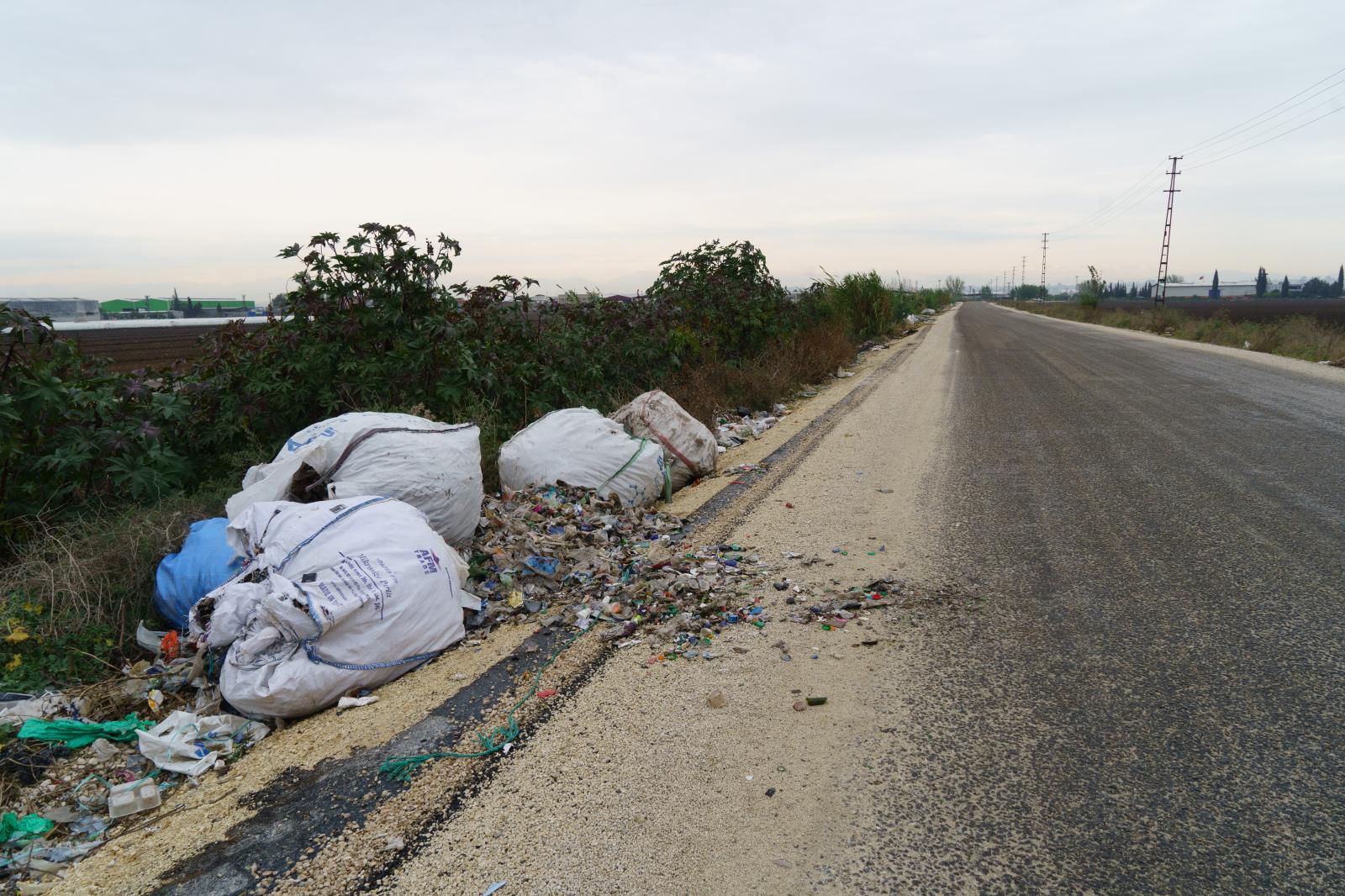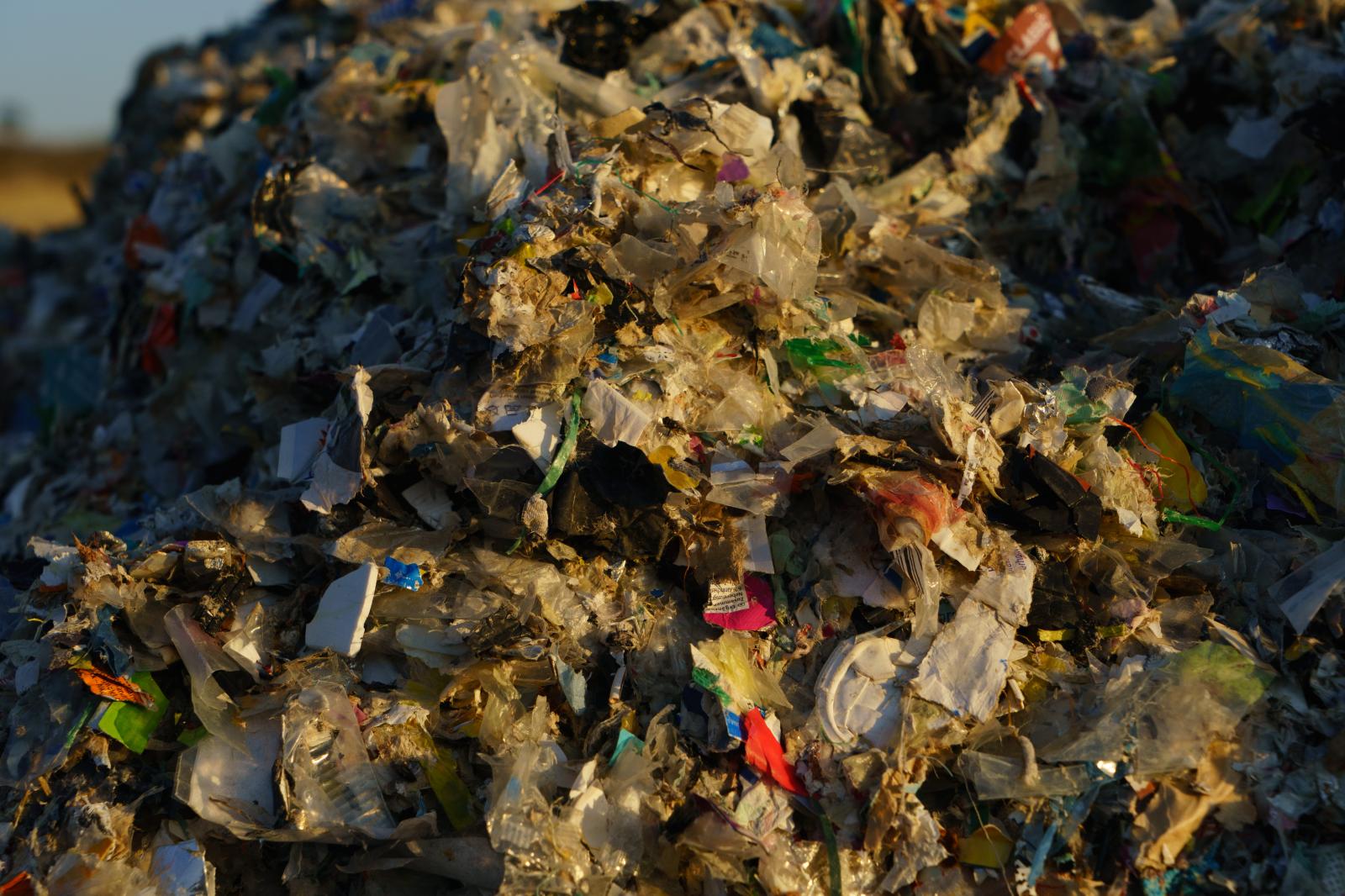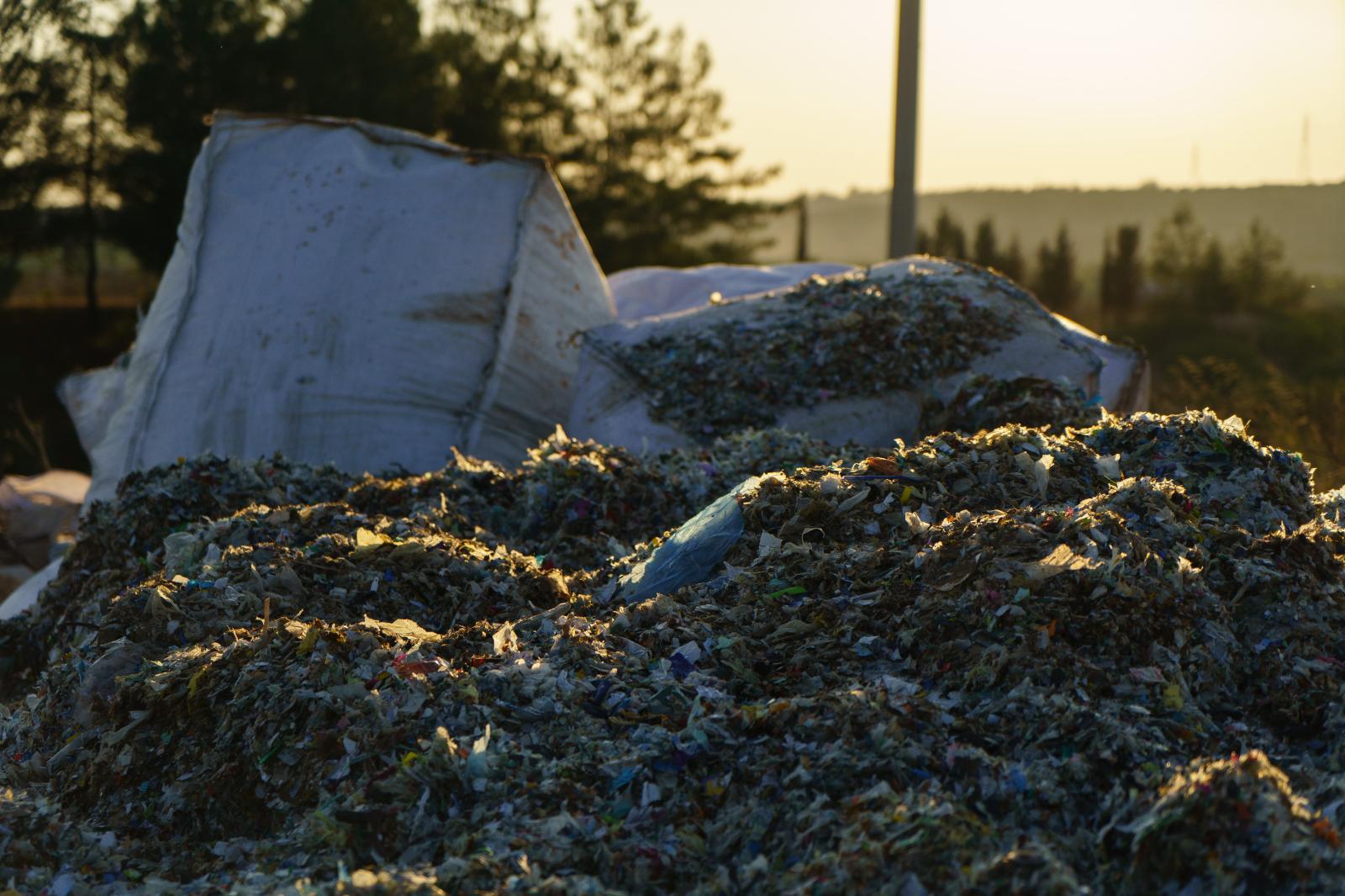Private Story
Refugees in Turkey get exploited in the recycling industry
By Nicole Graaf & Emre Çaylak
Ismail* looks tired. He's sitting in his living room, a narrow room flanked by two worn beige sofas, with a small electric heater in the corner behind the door. Ismail is wearing a tracksuit, a skinny man in his thirties with a mustache and black-rimmed fingernails. He works in one of the many recycling factories of Adana, a city in southern Turkey. "A few days ago I had to stand in cold water for an hour and a half to clean the machine's washing pool," says Ismail with a hoarse voice, snuffling after each sentence. "I'm sick, but my boss is urging me to come to work anyway." His wife Fatma* brings a tray with tea, sits down next to him ad lights a cigarette. Their two sons, eight and five years old, play with her mobile phone tugging at her long polyester dress every few minutes to get her attention. Fatma and Ismail work in the same company. Alongside other women, she is sorting bales of plastic waste. He is working at the recycling machine, a roughly 50-meter-long structure made up of hoppers, tubs and conveyor belts that rise up almost to the ceiling of the factory building. He fills in the pre-sorted plastic and pours water into its pool to wash the material. Then he adds oil and acid powder to soften. The machine melts the plastic and turns it into small flat pellets called recyclate. The company sells it to plastic factories to be used for new products as secondary raw material. "During the break, we can only have a quick bite," says Ismail. “We get a bit of bread and cheese, three, four olives, that's all, and then we are ushered to continue working. When we want to drink tea we have to do that near the machine between all the dust and dirt.”
On the edges of Adana’s industrial area where Ismail’s workplace is located, there were still meadows with bushes and vegetable fields five, six years ago. Today one recycling factory follows the next. The boom in this industry in Turkey is linked to environmental policies in Europe and the price of crude oil: the EU, as well as Britain, have set a target to recycle 65 percent of their household waste by 2035. Some of the plastic materials have to be pre-sorted by hand though, which companies in industrialized countries deem to be expensive due to labor costs. Therefore they pass it on to recyclers in low-wage countries. Until 2017 the bulk of Europe’s plastic waste was exported to China. After China imposed an import ban other countries filled the blank spot. In recent years Turkey has emerged as the main destination. For plastics producers in the country, it is profitable to use recyclate instead of virgin plastic made of crude oil, all the more so the more expensive crude oil and the cheaper recyclate. To make their business even more profitable, recycling companies employ people like Ismail and Fatma. Ismail gets paid around 44 pounds per week, Fatma is around 38 pounds (exchange rate as of 26th January 2022). Fatma, a slender woman in her mid-twenties has a slim, almost childlike face heavily clad in make-up, her eyes lined with kohl. Following Syrian fashion she has pulled her white headscarf slightly over her chin and pinned it tightly at the back of her head. A few years ago, Ismail was injured by a big bale of waste material that fell off a stack. He wasn’t able to work for a few weeks, so he had to borrow money. “My boss gave me 300 lira (about 42 euros at the time). What am I supposed to do with that?” Ismail says cynically. He still owes about ten times as much to a friend who helped him out. This is why Fatma has to work as well. "I would rather be a housewife and take care of the children, but my husband’s earnings are not enough," she says with defiance in her voice.
She leaves her children with a neighbor while she is at work: "My oldest is eight, he should go to school," says Fatma. "But we can't afford that." Education is free in Turkey, but not the costs that come with it: bus fare, books, pens clothing. Although their wages are about the same as the Turkish minimum wage – before the latter was almost doubled in December due to inflation – Ismail and Fatma don’t have an official work permit and do not receive any social security which is actually mandatory in Turkey. For the approximately 4 million refugees in Turkey it is extremely difficult to obtain a work permit because of how the system works. Turkey’s law grants asylum only to refugees from Europe, legislation that goes back to international agreements after the second world war. Refugees from countries such as Syria, Iraq, or Afghanistan only receive a status of temporary protection. With this status come greater challenges to obtaining an official work permit. According to OCHA, the United Nations Office for the Coordination of Humanitarian Affairs, only 132,497 work permits have been issued to Syrians between 2016 and 2019 and this number includes the ones that just have been extended. Turkey is facing a dilemma in regard to the many refugees it hosts. If it were to give them all a work permit, it might stir up the anger of its own population. With inflation at 36 percent and youth unemployment at 22 percent, more and more Turkish people are seeing the refugees as competitors. Violence against them is on the rise. According to the estimates of OCHA about one million Syrians work in Turkey’s large informal sector, especially in agriculture, in textile factories, on construction sites, and in restaurants. It is unclear how many works in the recycling sector, but in Adana's industrial district they can be seen anywhere. "My boss says he's hiring us Syrians because he wants to help us," says Ali*, a tall, balding 30-year-old with a friendly, round face. He works at a large depot, where he is currently the only Syrian. Until recently they were six, he says. “One elderly man and the others were all children, eleven or twelve years old. They used to come on and off for a few days whenever their families needed extra money." Ali sits at the window of his sparsely decorated two-room apartment in Şakirpaşa, a poor district of Adana. His place of work is just a short walk away, past houses made of drab concrete. Small shops and street vendors are lined up along the main street. Ali has a matter-of-fact tone to the way he speaks, even when he talks about the bomb attack in his hometown, in which he was seriously injured. He cannot work with his right arm anymore. When he came to Turkey at first nobody wanted to hire him. So he collected plastic waste from public rubbish bins and sold it to the recycling factories. Eventually one of them offered him a job. He earns around 4 pounds a day sorting plastic material by color and material type. “My boss said, you can only work with one hand, so you get half of what the others are getting,” he says. Ali is dependent on the job, but most workers last only a few days at his workplace, he explains: “They can't stand the stench. It is harmful to the lungs.” Plastic products often contain chemical additives which can dissolve in the decomposition process. "Because of my asthma, I sometimes have breathing difficulties when I'm working with the plastic," says Ali. Because of the high inflation in Turkey, his meager salary is hardly enough to meet his daily expenses. "My wife recently moved in with her family for ten days, so we can cut a bit on costs," he says, his voice beginning to tremble. His heavily pregnant wife is busy in the kitchen. Ali is grateful to her. "She understands our situation and knows how to deal with it," he says. On a small table next to him lies a Quran with golden writing on a black cover. Ali likes to recite it when he comes home from work in the evening. It gives him some comfort. He does not know where the material processed in his factory comes from. It must be household waste from the area around Adana, he suspects. Ismail worked for a large company that imported plastic waste from abroad until a few months ago. Sometimes auditors came to check the machines and employment contracts, says Ismail: "Once a group came from Germany and we had to clean the whole factory until midnight. And then we were sent away and weren't allowed to show up again until the head worker called us.” The inspection was announced prior to the visit. This gives companies an opportunity to hide their wrongdoings, a problem that many industrial sectors face in their supply chain management. One environmental engineer at a recycling factory in Adana agreed to talk about their business but asked not to be named. "95 percent of our material comes from Europe," he says. "The plastic waste we get from there has a better quality than what we get in Turkey because it is pre-sorted.”According to statistics collected by Greenpeace, the main exporter for plastic waste to Turkey in 2020 has been Britain with 209,642 tons, followed by Belgium with 137,071 tons and Germany with 136,083 tonsIn the factory building next to the engineer’s office, workers are tearing apart huge bales of plastic waste using a forklift. Four women gather up the loose material and throw it onto the conveyor belt of a machine. The large construction fills half of the hall. "Please do not take pictures of the workers”, the engineer seems to have a good reason for saying this. The way the female workers are dressed – in long, tube-shaped dresses – and the way they tie their headscarves indicate that they too are from Syria. Recycling company owners are nervous about bad publicity. Environmentalists and residents keep complaining about the environmental pollution caused by the companies. Many illegal dumping areas are scattered around the outskirts of Adana on roadsides and fallow land. One such popular dumping ground is a small canal that flows through the industrial area. South of Adana, it merges with the Şeyhan River and then flows into the Mediterranean Sea. Just outside the industrial area on a stretch of about 1,5 miles along the canal waste is scattered on its banks between reeds growing there. Some of the piles are smoldering. The water is partly covered with foam. Plastic snippets and burnt remains float in it. Along the river bank labels on intact packaging reveal their origin: Mineral water from Sweden, hard cheese from Austria, tiramisu from Poland, Orange juice from Germany. And for the most of it, waste from Britain: Packaging of anything from dog food to french fries stemming from major supermarket chains. Ismail knows how the garbage got there. At his former employer – the one who was hiding the Syrians from foreign auditors – he and five or six Syrian colleagues were given the task to load the waste material the machine couldn’t process onto a truck and take it to the canal. It was done every few days, always after dark, he recalls. "We spread it along the bank and set it on fire," he explains. "When we came with the next load, we shoveled the remains into the canal." One was at the top, one further down the embankment. A third stood inside the river and moved it down so that the water would wash it away. "The company didn’t call on garbage collection to pick up the leftovers because they would have had to pay for it," says Ismail, raising his bushy eyebrows with contempt. In May 2021, Greenpeace released a report on the pollution caused by illegally dumped plastic waste in Turkey, which caught some major public outcry. Shortly thereafter, the Turkish government issued an import ban for the most common types of plastic waste. It ordered the recycling companies to renew their licenses and prove that they work in accordance with environmental standards. Despite the import ban, shipments from Germany are almost back to the former level. Experts assume that imports from other countries will follow suit shortly. For the refugee workers in the factories, the import ban has brought about more difficulties. After the ban Turkish recyclers resorted to filling their machines with domestic plastic waste. But there is no garbage separation system for households. Plastic packaging, leftover food, and everything else ends up in the same bin, so it’s dirtier.At his former employer, the big company that imported waste, the material was pretty clean, Ismail recalls. But where he works now, the material they receive is often very dirty – “real garbage”, he says. He believes it is municipal waste from around Adana. “The stench even penetrates the room where we take our lunch break. We don’t feel like eating. I could use ten face masks and still smell it.” The company works illegally anyway, he says. Even the electricity is tapped illegally. He displays a video on his cell phone. It shows a forklift ripping apart bales of rubbish. Thin, colored plastic bags hang out in tatters, a cloud of vapor rising from the inside of the bale: "Just look at this," Ismail comments, his gesturing hands expressing his frustration. While the exporting countries are quick to point to shortcomings in enforcing laws on the end of importer countries such as Turkey, environmentalists agree that at least half of the responsibility lies with the exporting entities as well: If they don’t stop tolerating environmental pollution and exploitation of workers at their business partners abroad nothing will likely change any time soon.


















